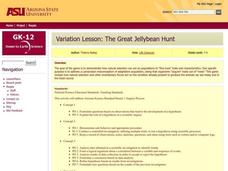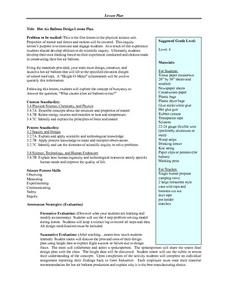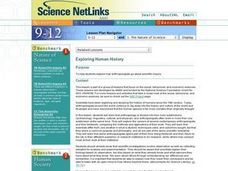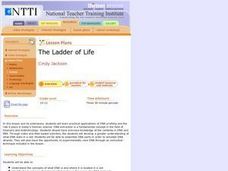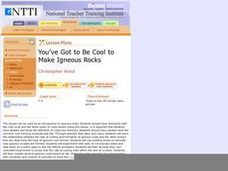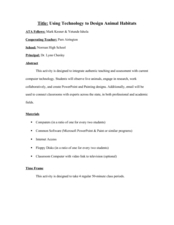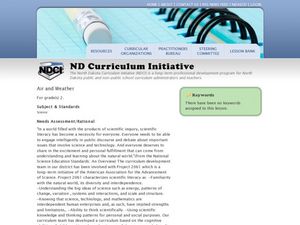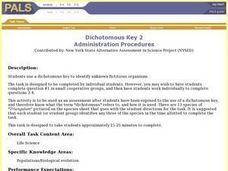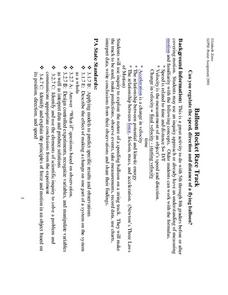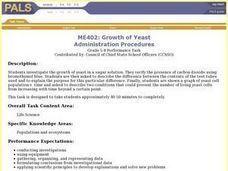Curated OER
The Great Jellybean Hunt
Students explore natural selection and its influence on the populations to fine tune traits and characteristics. The acquisition of traits developed out of need is examined through a game played in class.
Curated OER
School Lighting Audit Action Plan
Learners write a school lighting audit action plan from the data they collected in previous lessons. They develop a presentation that shows the results of the data and their recommendations. They present their action plan to their...
Curated OER
Hot Air Balloon Design Lesson Plan
Sixth graders discuss what they know and what they want to know about hot air balloon using a KWL chart. They then use a wide array of materials to design a hot air balloon that will lift successfully in cooperative groups referring to...
Curated OER
School Lighting Audit Preparation
Students work together to develop a school lighting audit plan. They practice using new vocabulary related to an energy audit. They also identify the components of a school lighting audit.
Curated OER
Layers of the Earth
Eighth graders study the earth's surface. In this planet structure lesson students view a PowerPoint presentation then draw and label the earths layers.
Curated OER
Exploring Human History
Students study the four main subdivisions of anthropology and how they overlap. They explore the careers of several contemporary anthropologists and their fieldwork, comparing the methods and applications of their work.
Curated OER
The Wonderful World of Waves (Wave Basics)
High schoolers define amplitude, wavelength, frequency, and period, calculate period given frequency, and calculate frequency given period, define crest and trough and locate both on diagram of wave, differentiate between latitudinal and...
Curated OER
The Ladder of Life
Students explain the concepts of what DNA is and where it is located in a cell, identify the two types of molecules that make up the rungs of a DNA molecule and identify the two types of Purine and Pyrimidine molecules
Curated OER
You've Got to Be Cool to Make Igneous Rocks
Students describe how igneous rocks are formed, design a classification system to group igneous rocks and develop a controlled experiment to prove that the rate of cooling affects the size of the crystals.
Curated OER
Rocks and Minerals
Learners are able to describe earth processes (e.g., rusting, weathering, erosion) that have affected selected physical features in students, neighborhoods. They are able to identify various earth structures (e.g., mountains, faults,...
Curated OER
Using Technology to Design Animal Habitats
Young scholars study the relationship between an animal and where it lives. In this habitats lesson students research to obtain data and create a professional report.
Curated OER
The Colors of Seasons
Students observe each season and and mark the colors they see. In this colors of the seasons lessons, students read The Mystery of the Missing Hummingbirds and compare their results and note variations of colors in the different...
Curated OER
Design Your Own Rube Goldberg Machine
Students participate in a culminating activity for a unit on Energy and Simple Machines. They are challenged to incorporate simple machines in to a complex mechanical system. While designing and testing their machine they will also...
Curated OER
Invent on the Spot
The best inventions come from a problem that needs to be solved! Given a container with holes in...
Curated OER
Indirectly Direct
Student form and test hyptheses using indirect and direct observation. They launch marbles to determine the shape of a hidden object.
Curated OER
Air and Weather
Second graders study Earth's materials. In this air and weather lesson, 2nd graders note changes in the weather and examine tools that help us study the weather. Students analyze how changes in the environment make changes in the...
Curated OER
Swings
Young scholars investigate variables which may seem to affect the movement of a pendulum, or "swing."They interpret their observations and apply the scientific principles to develop explanations and solve a new problem.
Curated OER
Dichotomous Key 2
Students use a dichotomous key to identify unknown fictitious organisms in an assessment designed to be used after a discussion on the use of a dichotomous keys has occurred. Follow up questions about key included.
Curated OER
Tadpoles
Young scholars examine tadpoles at various stages of development. Questions in observation category assess students' ability to use a variety of senses to observe data in a certain way-scientific way.
Curated OER
Old Solutions - New Solutions
Students examine descriptions of a mining company's land-reclamation project. They share information to analyze the environmental impact of the project. Independently, they answer questions on environmental and economic issues...
Curated OER
Paper Airplanes and Scientific Methods
For this scientific method and paper airplanes worksheet, students go through the steps of the scientific method to determine which paper airplane design is best. They complete 8 steps of the scientific method including stating the...
Curated OER
Balloon Rocket Race Track
Students discuss "How can we measure (or make it easier to record) the speed, distance or acceleration of the balloon?" They told that they are going to make a balloon racetrack. Pupils use meter sticks to accurately measure length and...
Curated OER
Where are all the Animals?
Students view animals that camouflage at the Shedd aquarium website. In this camouflage lesson, students recognize that there are different types of camouflage, cryptic coloring, counter-shading, warning coloration and mimicry. Students...
Curated OER
ME402: Growth of Yeast
Students investigate the growth of yeast in a sugar solution. They verify the pressure of carbon dioxide using bromothymol blue. Students are asked to describe the difference between the contents of the test tubes used and to explain...
Other popular searches
- Inquiry Based Science Lessons
- Inquiry Based Science Water
- Science Inquiry Based
- Inquiry Based Science Lessons
- Inquiry Based Science Sose
- Inquiry Based Science Souse
- Science Inquiry Based Learning
